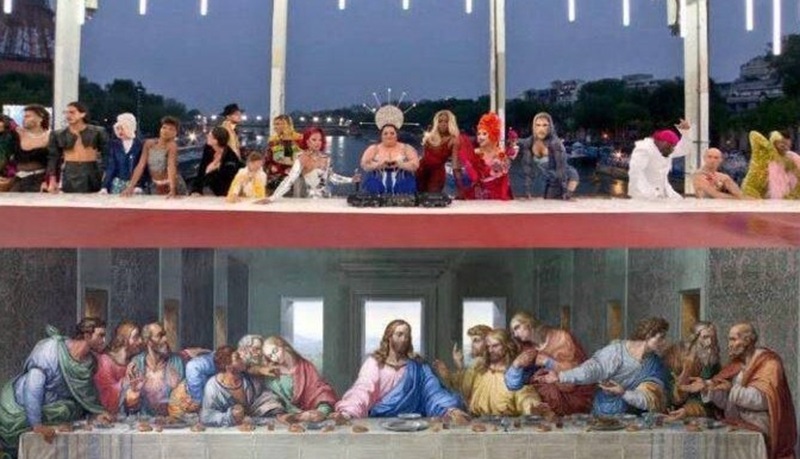The 2024 Summer Olympics, a global celebration of sports, commenced on July 27 in Paris, France, but the opening ceremony has sparked significant backlash from the global Catholic and Christian communities.
The controversy arose from a performance depicting a “Last Supper” scene featuring a drag queen, which many viewed as a mockery of Christian iconography. Some corporations have even withdrawn their advertising sponsorships for the Olympic Games in response.
As the controversy gained momentum, the Paris Olympic Organizing Committee held a press conference on July 28 to address the issue. The committee stated, “Clearly there was never an intention to show disrespect to any religious group. If people have taken any offense, we are, of course, really, really sorry.”

This is not the first time the Olympics have encountered religious controversies. Experts point out that the origins of the Olympics are deeply rooted in religious rituals. This article explores the intricate relationship between the Olympics and religion.
Paris Olympic controversy
The scene that triggered the backlash was a parody of Leonardo da Vinci’s famous painting “The Last Supper.” Instead of Jesus and his disciples, the table featured performers including drag queens and transgender models dressed in blue. A French singer later performed a song titled “Nu” – or “Naked” while lying on the table in a sheer outfit.
“The Last Supper” depicts the moment when Jesus dined with his twelve disciples on the night before his arrest and crucifixion. Following the broadcast of this scene worldwide, Bishop Robert Barron of the Diocese of Winona-Rochester in Minnesota criticized the performance on his X (formerly Twitter) account, calling it “an outrageous and thoughtless mockery” and a symbol of “a deeply secularized postmodern society hostile to Christianity.”
He further questioned, “Would they ever have dared mock Islam in a similar way? Would they dare publicly ridicule a scene from the Quran?”
The French Bishops’ Conference also released a statement condemning the scene as a mockery of Christianity.
The Korean Church Council (KCC) echoed these sentiments on July 29, stating that the parody scene undermined the Olympic spirit of mutual understanding and peace across races, genders, and religions and criticized the organizing committee for bringing ideology into the Games.
C Spire, a major telecommunications company headquartered in Mississippi, expressed shock at the mockery of “The Last Supper” during the Paris Olympics opening ceremony and announced via social media that they would halt their advertising for the Olympics.
The Olympic Games’ religious origins
The Olympic Games, which began in 5th century BC Greece, were closely linked to the worship of their gods. During the torch lighting ceremony at the ruins of ancient Olympia on April 16, a high priestess performed a prayer to Apollo, the ancient Greek sun god.
In a 2016 interview with the Religion News Service, historian Paul Cartledge explained that for ancient Greeks, the Olympic Games were a literal religious exercise representing devotion and worship. He cited rituals such as the crowning of victors with olive leaves from sacred trees dedicated to Zeus and the procession of victors to the temple of Zeus, where sacrifices were made.
The ancient Olympics were abolished in 393 AD when Christian Emperor Theodosius I banned all pagan rituals.

The modern Olympics’ rebirth
After nearly 1500 years, the Olympics were revived in 1889 as a means to promote peace between nations and rebuild France’s athletic prowess. Pierre de Coubertin, a French noble educated by Jesuits, was inspired by the work of Thomas Arnold, a deacon of the Church of England and advocate of “muscular Christianity,” which emphasized the combination of physical strength and religious devotion to create morally upright men.
According to Antony Moretti, a professor at Robert Morris University in Pittsburgh, de Coubertin believed that Olympic athletes should embody a “personal sacred temple.” After founding the International Olympic Committee in 1894, de Coubertin incorporated many religious elements from the ancient games into the first modern Olympics held in Athens two years later.
Modern Olympics and civic rituals
Today, the Olympics still retain a religious character, albeit subtly. The raising of the Olympic flag, the playing of the Olympic anthem, and the lighting of the Olympic flame all carry religious overtones. During the opening ceremony, athletes and coaches take the “Olympic oath,” pledging to respect and abide by the rules, compete fairly, and refrain from cheating.
Moretti notes that athletes who adhere to these rules and achieve victory are often revered almost as “sacred” athletes, while those who break the rules face spiritual rather than legal consequences. Post-Olympics, the venues often become revered sites attracting many visitors.
Recognizing that many athletes seek spiritual resources for mental stability amidst fierce competition, modern Olympic committees provide extensive support. Although specific religious symbols are prohibited during competitions, personal religious practices are allowed.
According to AP News, over 120 religious leaders from various faiths, including Buddhism, Christianity, Hinduism, Islam, and Judaism, are currently offering spiritual support to athletes and staff at the Olympic Village. They provide worship services, prayers, and counseling to help athletes and staff cope with their challenges and mental stress.
BY NICOLE CHANG, YOUNGNAM KIM [chang.nicole@koreadaily.com]



![Green card interviews used as decoy for ICE arrests U.S. Immigration and Customs Enforcement (ICE) agents arrest a man after a hearing at an immigration court in Manhattan, New York, on Oct. 27. [REUTERS]](https://www.koreadailyus.com/wp-content/uploads/2025/12/1226-ICE-100x70.jpg)
